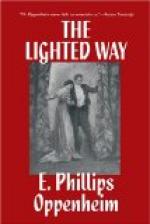Mr. Weatherley remained for a moment in the chair where she had left him, gazing idly at the counterfoil of the cheque. Then he rose and from a safe point of vantage watched the car drive off. With slow, leaden footsteps he returned to his seat. It was past his own regular luncheon hour, but he made no movement to leave the place.
CHAPTER XI
AN INTERRUPTED LUNCHEON
The great car swung to the right, out of Tooley Street and joined the stream of traffic making its slow way across London Bridge. Fenella took the tube from its place by her side and spoke in Italian to the chauffeur. When she replaced it, she turned to Arnold.
“Do you understand what I said?” she asked.
“Only a word or two,” he replied. “You told him to go somewhere else instead of to the Carlton, didn’t you?”
She nodded, and lay back for a moment, silent, among the luxurious cushions. Her mood seemed suddenly to have changed. She was no longer gay. She watched the faces of the passers-by pensively. Presently she pointed out of the window to a gray-bearded old man tottering along in the gutter with a trayful of matches. A cold wind was blowing through his rags.
“Look!” she exclaimed. “Look at that! In my own country, yes, but here I do not understand. They tell me that this is the richest city in the world, and the most charitable.”
“There must be poor everywhere,” Arnold replied, a little puzzled.
She stared at him.
“It is not your laws I would complain of,” she said. “It is your individuals. Look at him—a poor, shivering, starved creature, watching a constant stream of well-fed, well-clothed, smug men of business, passing always within a few feet of him. Why does he not help himself to what he wants?”
“How can he?” Arnold asked. “There is a policeman within a few yards of him. The law stands always in the way.”
“The law!” she repeated, scornfully. “It is a pleasant word, that, which you use. The law is the artificial bogey made by the men who possess to keep those others in the gutter. And they tell me that there are half a million of them in London—and they suffer—like that. Could your courts of justice hold half a million law-breakers who took an overcoat from a better clad man, or the price of a meal from a sleek passer-by, or bread from the shop which taunted their hunger? They do not know their strength, those who suffer.”
Arnold looked at her in sheer amazement. It was surely a strange woman who spoke! There was no sympathy in her face or tone. The idea of giving alms to the man seemed never to have occurred to her. She spoke with clouded face, as one in anger.
“Don’t you believe,” he asked, “in the universal principle, the survival of the fittest? Where there is wealth there must be poverty.”
She laughed.




